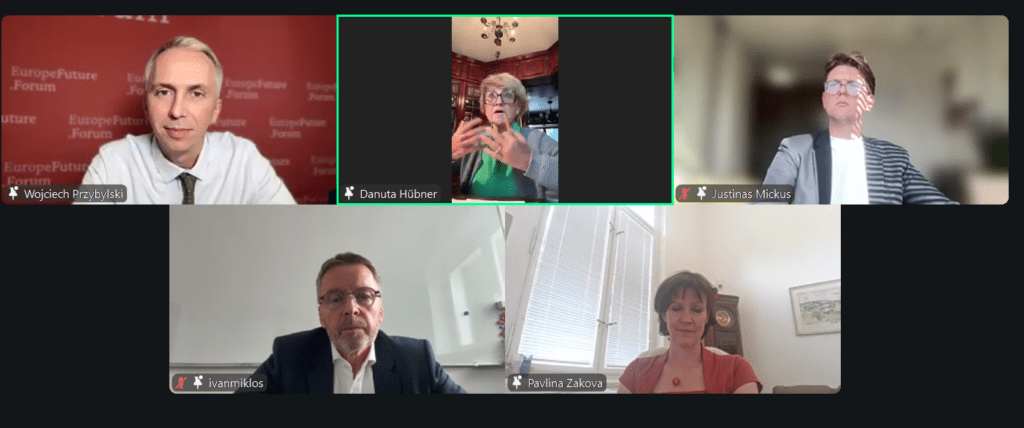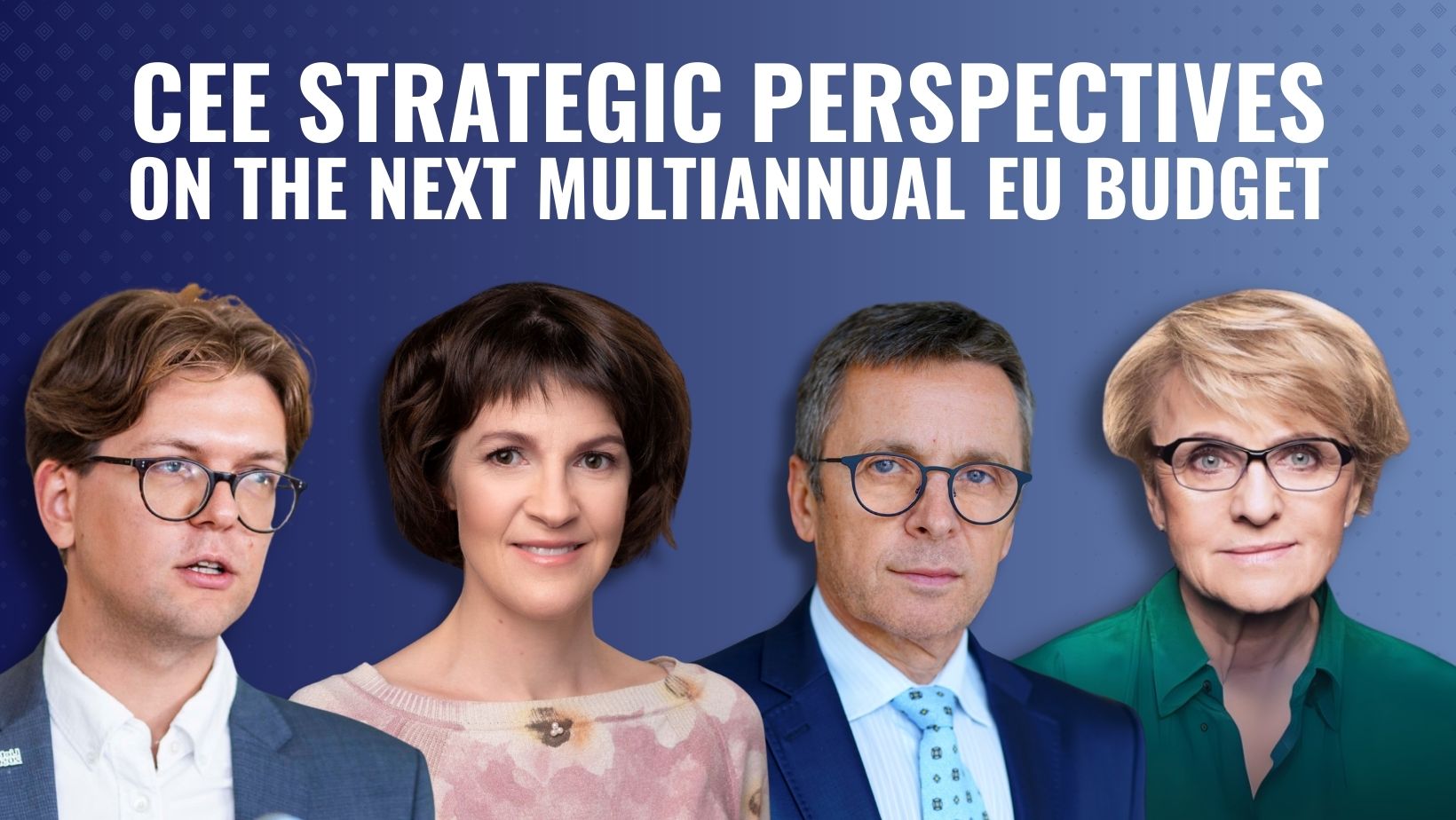Energy, defence and innovation take centre stage as Central and Eastern Europe vie for influence in the EU’s next Multiannual Financial Framework.
Policy leaders from across Central and Eastern Europe see the 2028-2034 Multiannual Financial Framework as the stage for their region’s ambitions about European security and competitiveness against mounting global challenges.
The Visegrad Insight debate between the Czech Deputy Minister for European Affairs, former Polish EU Commissioner, former Slovak Deputy Prime Minister for Economy and a Lithuanian Government’s Strategic Analysis Centre expert set the stage for this year’s Europe Future Forum.
Scroll down or click here to watch the recap of the debate
The discussion quickly turned to the question of values. ‘Budgets are statements of our values,’ Wojciech Przybylski, Editor of Visegrad Insight, moderating the debate, reminded the audience, framing the negotiations as a choice between deeper integration and narrow national interest.
With this new budget proposal, the European Union wants to communicate its future ambitions. And in terms of expression of values, Pavlína Žáková, Deputy Minister for European Affairs, believes that ‘the Commission clearly puts an emphasis on areas where the common EU budget can achieve more than the individual national budgets’ despite the EU budget is just a small fraction of the national budgets of some member states.
But Ivan Mikloš – Former Deputy Prime Minister – immediately stressed that in his view, the current Slovak government position is not in line with what he believed to be these types of European values.
Principles and limits
From Prague, the message was cautious optimism, with a caveat of the unknown impact of the future Czech government to be formed after elections this autumn. From this perspective, the Commission’s proposal has the usual flavour of ‘added EU value’ – from solidarity to rule of law. But in Bratislava, there is a sense of scepticism that the EU budget can deliver a meaningful difference under this government.
Yet, Ms Žáková’s comments on the new EU revenues were blunt: any new EU-wide taxes to produce the so-called EU Commission’s ‘own-resources’ remain unpopular in Czechia. Therefore, any necessary increases to the budget should – in her opinion – go through government payments tied to the direct Gross National Income (GNI) contributions, she explained, stressing the government is only a day from adopting its official position on the issue.
Politics over defence
Mr Mikloš warned that current EU budgetary provisions for defence look negligible against mounting threats.
However, the Former Deputy PM highlighted an important political dimension: from Italy and France to Poland and Slovakia, extreme-right forces are either in power or gaining ground across Europe.
‘What is the common denominator in their policy? They want to reduce and not strengthen Europe, which leads to a strong contradiction or problem where the real politics will go in direct competition against what we need in the future,’ Mikloš said, stressing that it leaves little space for bold reforms or new spending structures.
Questions about Slovakia’s capacity to manage new Commission-led funding instruments drew a hesitant response: reforms are needed, but political will is lacking.
Justinas Mickus – Senior Policy Analyst at the Lithuanian Government’s Strategic Analysis Centre – added colour to the discussion saying, ‘The key public good for Europe today is security… defence funding, and defence and security are not separable from enlargement.’
Yet as several participants underlined, this clash between political realities and security imperatives could define the MFF talks ahead. Without consensus on Europe’s role in defence, the region risks entering negotiations divided – and leaving with little more than symbolic allocations.
Click the banner to learn more about
From cohesion to competitiveness
By contrast, Danuta Hübner – former European Commissioner for Trade and MP – called for ambition. Hübner criticised what they described as ‘bad European narratives’ that pit cohesion against competitiveness, urging instead a vision of Europe that links investment, sustainability and innovation.
Prof Hübner added, ‘The Commission was facing a dilemma: should they really care now in difficult times about effectiveness and efficiency, or should we also care about politics, decentralisation, proximity to people, the European public good?’
Poland, expected to be the largest beneficiary of the next budget, is unapologetic about wanting to win in both traditional cohesion and new competitiveness funds.
But the challenge, as one comment later in the discussion stressed, lies in preparation: without a credible industrial strategy, Central Europe risks falling behind in the race for innovation financing, especially from the new European Competitiveness Fund.
Several speakers acknowledged that CEE countries still struggle to tap EU programmes like Horizon and Digital Europe.
‘A very urgent concern… is that some of those funds in their design do not provide equal opportunity to smaller member states that have smaller enterprises or smaller research institutions,’ one expert noted.
In Czechia and Slovakia, cohesion dominates receipts, leaving directly managed programmes underused. Calls emerged for geographic balance in the new Competitiveness Fund, so smaller and newer member states have a fairer shot.
Others stressed that national reforms – from research ecosystems to international partnerships – are equally necessary to compete effectively.
The frontline states
From the Baltic perspective, Lithuania positioned itself – and its neighbours – as ‘frontline states’.
Cohesion funds are ‘the vehicle we see to secure our cross-border infrastructure, so frontline states require specific needs to preserve critical infrastructure, be it energy connectivity, roads, railways, etc,’ one participant stressed.
The argument is simple: countries most exposed to Russian aggression deserve tailored support for infrastructure, connectivity and defence. This framing, speakers suggested, acknowledges the need for change in the budget while preserving cohesion as the vehicle for long-term investment.
Yet concerns remain: smaller states often lack equal access to research and innovation funds dominated by larger Western institutions. Without special provisions, Baltic and CEE countries risk being marginalised in the new instruments.
This concern echoes debates around the Recovery and Resilience Facility (RRF), where the introduction of national envelopes helped ensure fairer distribution and gave smaller states greater certainty.
Baltic officials suggested that a similar balance may be needed in the new MFF instruments to avoid leaving smaller research institutions and enterprises structurally disadvantaged.
Energy transition and revenue debates
The debate in the Q&A session for subscribers (not recorded) also touched on the EU’s ambitious climate objectives.
One intervention highlighted that while climate targets remain strong in the new framework, the removal of the Just Transition Fund could leave CEE countries exposed. Revenue-side reforms, such as the Emissions Trading System (ETS) based on own resources, sparked further debate.
Participants noted that the current budget proposal earmarks a significant share for energy transition and decarbonisation, with an EU-wide target of reducing the intensity of CO₂ emissions by 35%.
Yet one of the speakers argued this figure is not sufficient, stressing that ‘national super plans should go further, aiming for at least 43%’.
How negotiations unfold on this point will determine whether Central and Eastern European countries – which stand to receive proportionately higher allocations – can maintain momentum on decarbonisation while also coping with legacy dependencies on fossil fuels.
Baltic voices welcomed the Carbon Border Adjustment Mechanism (CBAM) but resisted handing over ETS revenues already earmarked for green transition domestically.
Private investment, the missing lever
The debate closed on a broader frustration. One veteran policymaker pointed out that while trillions are needed for Europe’s transformation, EU leaders instinctively look to public budgets, ignoring private capital.
Without using the EU budget as leverage to crowd in private investment, they warned, even the most ambitious MFF will fall short.
The debate underscored both unity and divergence. Central European leaders broadly back reform of the EU budget, but want guarantees that cohesion, agriculture and competitiveness funds remain accessible.
Baltic states are reframing budget priorities around security, while Poland seeks to position itself as both a cohesion beneficiary and a competitiveness contender. Slovakia, meanwhile, faces doubts about its capacity to deliver.
What emerged most clearly was the sense that the EU budget is no longer just about redistribution.
For Central Europe, it has become a battleground for defining Europe’s role in defence, innovation and enlargement. The next MFF will reveal whether the region can move beyond dependency narratives and become a driver of Europe’s future prosperity and security.
_
Debate Video

Speakers:
Danuta Hübner – Professor of economics and politician, with a lengthy academic career and three decades of experience in shaping the European Union as a former European Commissioner for Trade and Regional policy, member of the European Parliament and senior government official in Poland, involved in the country’s transition to the democracy and market economy. As Chair of the Office for European Integration and Minister for European Affairs she was in charge of the accession of Poland to the European Union. She was deputy minister for Industry and Trade, chief negotiator of Poland’s accession to OECD, Head of the Chancellery of the President of Poland. She was also UN Undersecretary General and Executive Secretary of the Economic Commission for Europe in Geneva. In the European Parliament, she was rapporteur for major capital market legislations.
Justinas Mickus – Senior Policy Analyst at the Lithuanian Government’s Strategic Analysis Center (STRATA) and an Associate Analyst at the European Council on Foreign Relations (ECFR) and the Vilnius-based Geopolitical and Security Studies Center. His research mainly focuses on EU politics and integration, as well as trade and economic security policy. His recent and ongoing projects covered Lithuania’s strategic trade dependences, Lithuania’s upcoming EU Council presidency in 2027, and the upcoming EU MFF negotiations. At STRATA, he also serves as the Strategic Foresight lead and conducts studies as well as provides methodological support in government foresight.
Ivan Mikloš – Former Deputy Prime Minister and Minister of Finance of the Slovak Republic (2002-2006, 2010-2012), Deputy Prime Minister for Economy (1998-2002), and Minister of Privatisation (1991-1992). During 2015-2016 he served as a Chief Advisor to the Minister of Finance of Ukraine and as an Advisor to the Minister of Economic Development and Trade of Ukraine. He served as an Advisor to the Prime Minister of Moldova (2021-2022). From March 2022 until June 2024, he was an Advisor to the President of the Slovak Republic in the field of economic policy. Ivan Mikloš was one of the leading figures of economic transformation in the Slovak Republic.
Pavlína Žáková – appointed as Deputy Minister for European Affairs in March 2024, after having served for two years as a Principal Advisor to the Minister. Before, she worked as an economist in the European Commission (2005-2022), including eight years at the Representation of the European Commission in the Czech Republic. In her previous career, she worked at the Ministry of Finance as an advisor to the Deputy Minister for Public Budgets and at the Office of the Government as an advisor to the State Secretary for EU Affairs.
Moderator: Wojciech Przybylski – political analyst heading Visegrad Insight’s policy foresight on European affairs. His expertise includes foreign policy and political culture. Editor-in-Chief of Visegrad Insight and President of the Res Publica Foundation. Europe’s Future Fellow at IWM – Institute of Human Sciences in Vienna and Erste Foundation.
Newsletter
Weekly updates with our latest articles and the editorial commentary.


